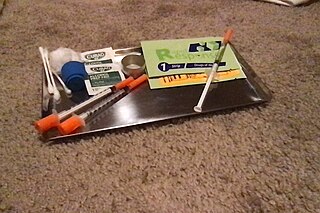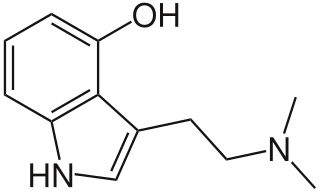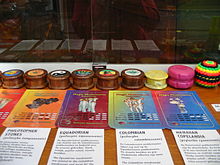
While recreational use, possession and trade of non-medicinal drugs described by the Opium Law are all technically illegal under Dutch law, official policy since the late 20th century has been to openly tolerate all recreational use while tolerating the other two under certain circumstances. This pragmatic approach was motivated by the idea that a drug-free Dutch society is unrealistic and unattainable, and efforts would be better spent trying to minimize harm caused by recreational drug use. As a result of this gedoogbeleid, the Netherlands is typically seen as much more tolerant of drugs than most other countries.

Psilocybin is a naturally occurring psychedelic prodrug compound produced by more than 200 species of fungi. The most potent are members of genus Psilocybe, such as P. azurescens, P. semilanceata, and P. cyanescens, but psilocybin has also been isolated from about a dozen other genera. Psilocybin is itself biologically inactive but is quickly converted by the body to psilocin, which has mind-altering effects similar, in some aspects, to those of lysergic acid diethylamide (LSD), mescaline, and dimethyltryptamine (DMT). In general, the effects include euphoria, visual and mental hallucinations, changes in perception, distorted sense of time, and perceived spiritual experiences. It can also cause adverse reactions such as nausea and panic attacks.

Psilocybe cubensis, commonly known as the magic mushroom, shroom, golden halo, cube, or gold cap, is a species of psilocybin mushroom of moderate potency whose principal active compounds are psilocybin and psilocin. It belongs to the fungus family Hymenogastraceae and was previously known as Stropharia cubensis. It is the best-known psilocybin mushroom due to its wide distribution and ease of cultivation. This mushroom being optimal for home cultivation specifically, as was suggested in the 1970s, is primarily what led to P. cubensis being the psilocybin mushroom species most common on the black market as a street drug.

"Drug paraphernalia" is a term to denote any equipment, product or accessory that is intended or modified for making, using or concealing drugs, typically for recreational purposes. Drugs such as cannabis, cocaine, heroin, fentanyl, and methamphetamine are related to a wide range of paraphernalia. Paraphernalia generally fall into two categories: user-specific products and dealer-specific products.

Psilocybin mushrooms, commonly known as magic mushrooms or shrooms, are a polyphyletic informal group of fungi that contain psilocybin, which turns into psilocin upon ingestion. Biological genera containing psilocybin mushrooms include Psilocybe, Panaeolus, Inocybe, Pluteus, Gymnopilus, and Pholiotina.

A head shop is a retail outlet specializing in paraphernalia used for consumption of cannabis and tobacco and items related to cannabis culture and related countercultures. They emerged from the hippie counterculture in the late 1960s, and at that time, many of them had close ties to the anti-Vietnam War movement as well as groups in the marijuana legalization movement like LeMar, Amorphia, and the National Organization for the Reform of Marijuana Laws.

Psilocin is a substituted tryptamine alkaloid and a serotonergic psychedelic substance. It is present in most psychedelic mushrooms together with its phosphorylated counterpart psilocybin. Psilocin is a Schedule I drug under the Convention on Psychotropic Substances. Acting on the 5-HT2A receptors, psilocin modulates the production and reuptake of serotonin. The mind-altering effects of psilocin are highly variable and subjective and resemble those of LSD and DMT.
A designer drug is a structural or functional analog of a controlled substance that has been designed to mimic the pharmacological effects of the original drug, while avoiding classification as illegal and/or detection in standard drug tests. Designer drugs include psychoactive substances that have been designated by the European Union as new psychoactive substances (NPS) as well as analogs of performance-enhancing drugs such as designer steroids. Some of these were originally synthesized by academic or industrial researchers in an effort to discover more potent derivatives with fewer side effects and shorter duration and were later co-opted for recreational use. Other designer drugs were prepared for the first time in clandestine laboratories. Because the efficacy and safety of these substances have not been thoroughly evaluated in animal and human trials, the use of some of these drugs may result in unexpected side effects.
Recreational drug tourism is travel for the purpose of obtaining or using drugs for recreational use that are unavailable, illegal or very expensive in one's home jurisdiction. A drug tourist may cross a national border to obtain a drug that is not sold in one's home country, or to obtain an illegal drug that is more available in the visited destination. A drug tourist may also cross a sub-national border to do the same, as in cannabis tourism, or purchase alcohol or tobacco more easily, or at a lower price due to tax laws or other regulations.

Psilocybe tampanensis is a very rare psychedelic mushroom in the family Hymenogastraceae. Originally collected in the wild in a sandy meadow near Tampa, Florida, in 1977, the fungus would not be found in Florida again until 44 years later. The original Florida specimen was cloned, and descendants remain in wide circulation. The fruit bodies (mushrooms) produced by the fungus are yellowish-brown in color with convex to conic caps up to 2.4 cm (0.9 in) in diameter atop a thin stem up to 6 cm (2.4 in) long. Psilocybe tampanensis forms psychoactive truffle-like sclerotia that are known and sold under the nickname "philosopher's stones". The fruit bodies and sclerotia are consumed by some for recreational or entheogenic purposes. In nature, sclerotia are produced by the fungus as a rare form of protection from wildfires and other natural disasters.

Methylone, also known as 3,4-methylenedioxy-N-methylcathinone (MDMC), is an empathogen and stimulant psychoactive drug. It is a member of the amphetamine, cathinone and methylenedioxyphenethylamine classes.

4-HO-MiPT is a synthetic substituted aromatic compound and a lesser-known psychedelic tryptamine. It is thought to be a serotonergic psychedelic, similar to magic mushrooms, LSD and mescaline. Its molecular structure and pharmacological effects somewhat resemble those of the tryptamine psilocin, which is the primary psychoactive chemical in magic mushrooms.

O-Acetylpsilocin is a semi-synthetic psychoactive drug that has been suggested by David Nichols to be a potentially useful alternative to psilocybin for pharmacological studies, as they are both believed to be prodrugs of psilocin. However, some users report that O-acetylpsilocin's subjective effects differ from those of psilocybin and psilocin. Additionally, some users prefer 4-AcO-DMT to natural psilocybin mushrooms due to feeling fewer adverse side effects such as nausea and heavy body load, which are more frequently reported in experiences involving natural mushrooms. It is the acetylated form of the psilocybin mushroom alkaloid psilocin and is a lower homolog of 4-AcO-MET, 4-AcO-DET, 4-AcO-MiPT and 4-AcO-DiPT.

A drug is any chemical substance that when consumed causes a change in an organism's physiology, including its psychology, if applicable. Drugs are typically distinguished from food and other substances that provide nutritional support. Consumption of drugs can be via inhalation, injection, smoking, ingestion, absorption via a patch on the skin, suppository, or dissolution under the tongue.

Drug policy of California refers to the policy on various classes and kinds of drugs in the U.S. state of California. Cannabis possession has been legalized with the Adult Use of Marijuana Act, passed in November 2016, with recreational sales starting January of the next year. With respect to many controlled substances, terms such as illegal and prohibited do not include their authorized possession or sale as laid out by applicable laws.

Synthetic cannabinoids are a class of designer drug molecules that bind to the same receptors to which cannabinoids in cannabis plants attach. These novel psychoactive substances should not be confused with synthetic phytocannabinoids or synthetic endocannabinoids from which they are in many aspects distinct.
The legal status of unauthorised actions with psilocybin mushrooms varies worldwide. Psilocybin and psilocin are listed as Schedule I drugs under the United Nations 1971 Convention on Psychotropic Substances. Schedule I drugs are defined as drugs with a high potential for abuse or drugs that have no recognized medical uses. However, psilocybin mushrooms have had numerous medicinal and religious uses in dozens of cultures throughout history and have a significantly lower potential for abuse than other Schedule I drugs.

Terms related to cannabis include:

Magic truffles are the sclerotia of psilocybin mushrooms that are not technically the same as "mushrooms". They are masses of mycelium that contain the fruiting body which contains the hallucinogenic chemicals psilocybin and psilocin.

Fun Guyz is a magic mushroom store chain mainly operating in Ontario, with 17 stores in the province and one in Quebec. Their business operates illegally, as sale and possession of magic mushrooms is illegal in Canada. These stores are frequently raided and their products confiscated. Potential customers are required to be at least 19 years old and sign a waiver before purchase. Customers must also pay in cash. The owner of the business believes that criminal charges would make a constitutional challenge for the legality of psilocybin possible due to similar actions taken by businesses before the broader legalization of cannabis. He also states that his products are for therapeutic use; however, the substance has not been approved by Health Canada. Identities for spokespeople of the business have varied. As of August 2023, police have sought an arrest warrant for the owner of the stores.

















